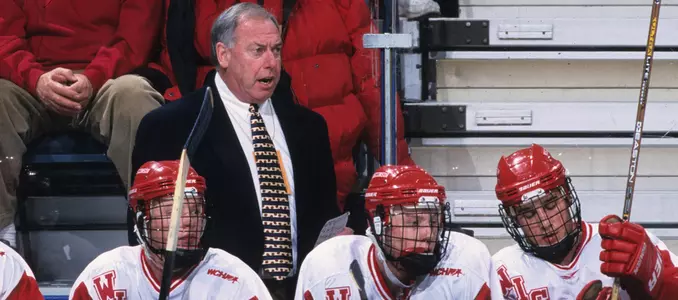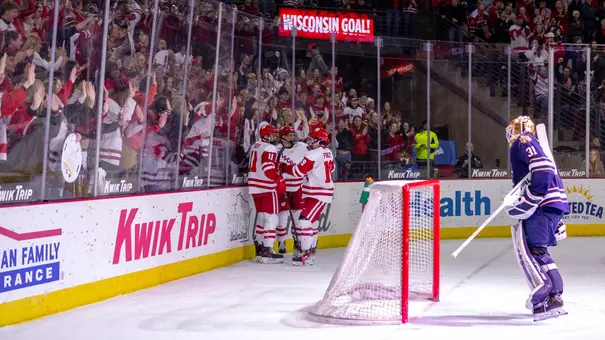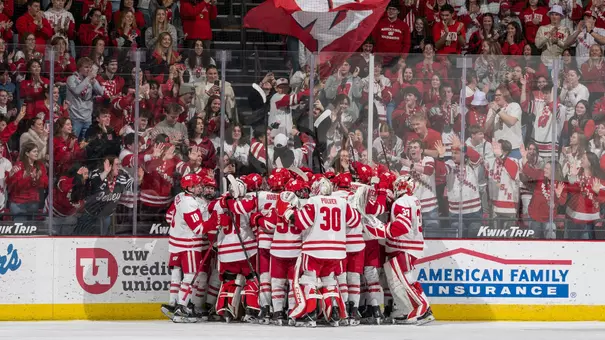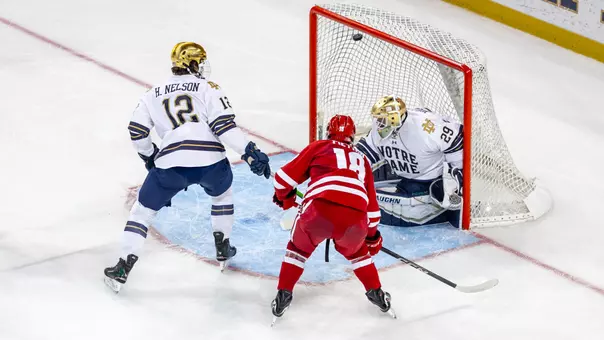
2016 Hall of Fame: Jeff Sauer
August 26, 2016 | General News, Men's Hockey, Andy Baggot
Former men’s hockey head coach led UW to two national titles
 |
||
|
BY ANDY BAGGOT
UWBadgers.com Insider
From Varsity Magazine
In the process of adding his name to another distinguished list, former Wisconsin men's hockey coach Jeff Sauer is helping finish off a unique project.
Sauer is included in the eight-person class being inducted in the UW Athletic Hall of Fame on Sept. 16.
It may seem like old hat for Sauer, who has already been inducted in the U.S. Hockey Hall of Fame (2014), the Colorado Springs Sports Hall of Fame ('13) and the Colorado College Athletic Hall of Fame ('07).
But this is a big deal to Sauer, who coached the Badgers from 1982 to 2002 and still lives in Middleton with his wife, Jamie. Their children, Chip and Beth, also live in the area as well as their four grandchildren.
A bronze plaque featuring Sauer's many accomplishments – including NCAA championships in 1983 and '90 – will be displayed on the outer wall of the Camp Randall Memorial Sports Center.
"I'm very honored," Sauer said. "It's a great group of people to be up on the end of the building."
Four are former Badgers who skated for Sauer, including fellow 2016 inductee Bruce Driver. The others are current UW men's coach Tony Granato (2000), Steve Reinprecht ('14) and Brian Rafalski ('15).
"I've been inducted into a lot of different things over the course of time and this one is special because of the amount of time we spent in Madison," Sauer said. "The kids grew up here. The grandkids are still in town. All those things are very positive."
The addition of Sauer to the UW Hall of Fame means that almost every Badgers coach to produce multiple NCAA championship teams is enshrined. That list also includes John Walsh (eight, boxing); Mark Johnson (four, women's hockey), Bob Johnson (three, men's hockey) and Peter Tegen (two, women's cross country).
The lone exception is Martin Smith, whose men's cross country teams won NCAA titles in 1985 and '88. He's still active, currently coaching at Iowa State.
Sauer spent 31 seasons coaching college hockey, including his last 20 at Wisconsin. His 655 career wins overall rank among the top 10 all-time. His 489 victories are the most in program history.
Sauer, a Colorado College graduate, took over for a pioneering legend, the late Bob Johnson, and guided his first team at UW to the national title in 1983.
Sauer's greatest asset during his debut season in Madison might have been his ability to embrace the obvious.
"I think he came in and saw we had a tremendous group that had success the year before," Driver said, referring to an NCAA runner-up finish in 1981-82. "There wasn't a whole lot for him to change."
The Badgers featured two future NHL captains on defense in Chris Chelios and Driver as well as two elite NHL-caliber wingers in Pat Flatley and Dave Maley. In goal was Marc Behrend, a two-time NCAA Frozen Four Most Outstanding Player.
"There were a lot of name players on that team," Sauer said. "I was very fortunate to inherit those guys."
"I've been inducted into a lot of different things over the course of time and this one is special because of the amount of time we spent in Madison. The kids grew up here. The grandkids are still in town. All those things are very positive."
Those who declined to give Sauer credit in '83, saying he won a title with Johnson's talent, were hushed in 1990 when his hand-crafted lineup swept the WCHA regular-season and playoff titles before securing the NCAA crown.
When Sauer resigned in 2002 he thought his days as a coach were through. He was approached by teams in the NHL needing an assistant coach and had interest from European teams looking for a head coach, but that would have required some major sacrifices by his family.
Sauer looked for ways to stay involved in the game as much as possible – taking administrative assignments with the WCHA and USA Hockey – but didn't think anything would lure him back behind the bench again.
To his eternal joy and satisfaction, he was wrong.
Sauer has national coaching jobs with hearing impaired and disabled sled hockey teams on behalf of USA Hockey.
"It's really rejuvenated me," he said. "When I left the university I was really in a situation where the recruiting was really getting out of whack. The day-to-day operation was kind of drawing on my stressful side, so to speak."
It all changed the first time Sauer ran a practice for his now-powerhouse Paralympic sled team. The squad is made up of athletes who have physical disabilities such as limb loss, spinal cord injury or cerebral palsy.
"I was on the ice with the guys for probably a total of about 10 minutes and I said, 'This is for me,'" he said.
"People told me when you retire you should go into a completely different business. There's some good thoughts about that because you've got responsibilities and you're doing something different."
Sauer said staying involved with hockey was the right thing for him.
"It's turned out to be a very, very good situation," he said.
Sauer, now 73, said his coaching plate is as full as it's ever been, but it's a different pace.
"It's more relaxing," he said. "The players that I'm coaching right now – in both activities – are very appreciative, very responsive and very coachable. They're happy to be there.
"It's really a positive group of players, both the hearing impaired and the sled hockey."
Sauer has guided the sled team to gold medals in all the top international events since 2011, including the Paralympics, and helped the hearing impaired squad to multiple medals since 2007.
"I've never really had a real job," Sauer said. "My dad told me that 40 years ago when I got into coaching. That's how I feel. I've enjoyed every minute of it."
It's been decades since Sauer matched coaching wits with the likes of Johnson, Herb Brooks, Ron Mason and John MacInnes. What keeps bringing Sauer back to the rink?
In short, the hearing impaired and disabled athletes bring a unique attitude.
"I may be patting myself on the back, but they've never had a coach with the type of experience I've had," Sauer said.
"The big thing is we treat them like hockey players; I don't treat them like handicapped individuals.
"It's refreshing to see how much of a sponge they are because they really haven't had a lot of coaching.
"It's a different kind of coaching. With the sled team, we're the best in the world. I boast about it, but we are. We can go against anybody in the world right now and I have a good feeling going into the game."
As for the hearing impaired, Sauer said, "we've developed a really good group of talented players at that level as well."
That kind of handiwork will get you into the hall of fame.
Perhaps more than one.













